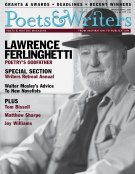"I wanted to write a book that was set in the past, the present, and the future all at the same time," says Sharpe. "Many of the chapters have point-by-point correspondences to things that happened in 1607, 1608. So that's the past part. Setting it in the future in which some kind of military annihilation has taken place is the future part, and then the present is the bridge between those two—the fact that the novel starts with this group of guys getting on an armored bus, leaving the island of Manhattan, and turning around to see the Chrysler building collapse into the ground unequivocally makes it about the present as well."
Although Soft Skull is committed to Sharpe for the long haul and interested in supporting whatever he chooses to write, Nash says he was drawn to Jamestown in particular for "the sheer ballsiness of it. I mean, here's a writer who has a breakout success with a dysfunctional suburban family novel, and what does he follow it up with?"
Sharpe, who splits his time between his home in Manhattan and Wesleyan University in Connecticut, where he teaches writing and literature, was born in 1962 and grew up in the suburbs of New York City. He says that he wanted to be a writer from about the age of ten. "My father is a publisher and my mother writes fiction and poetry and is a singer and songwriter, so the idea of writing and being an artist was a possibility that I was surrounded by constantly as a child." His father's company, M. E. Sharpe, publishes mostly academic books in the social sciences as well as journals and reference books. His mother, Jacqueline Steiner, is a noted folksinger whose achievements include cowriting the song, "MTA" (also known as "Charlie on the MTA"), which the Kingston Trio made famous with their 1959 recording.
Sharpe attended Oberlin College in Ohio, then moved in 1985 to New York City, where he began working in production for such commercial magazines as US and Condé Nast Traveler and writing fiction in his free time. He took classes at the 92nd Street Y where he met Lore Segal, who he cites as one of the most important teachers he's had and to whom he dedicated Jamestown. "She taught me how to edit my own work," he says. "She understood it, and—despite how semi-fledged I was then as a writer and a grown-up—she spoke to me about it with a seriousness that was very helpful."
In 1990 Sharpe attended Columbia University to purse his MFA. As part of a work study program, he taught writing in New York City public schools with Teachers & Writers Collaborative. He also assembled a short story collection as his thesis, which he tried unsuccessfully to get published. After graduating he wrote a novel and began working with agent Molly Friedrich, the cousin of a friend of his, to find a home for it. "There was one day, sometime in the mid '90s, when seventeen publishers got back to my agent all saying no," he says. "That was a hard day in my life."
After Columbia, Sharpe returned to working in magazine production, mostly for Self. He also wrote the occasional article for glossy magazines like GQ and continued writing fiction on the side. Eventually, though, the production work began to grate on him. "I remember very consciously: I actually became fixated on the radio in the production room playing the commercial station, and I couldn't take it anymore. I would start hyperventilating. That was a symptomatic key that something needed to change," he says with a laugh. Having completed another story collection, Stories From the Tube, and started a novel, Sharpe quit, lived off of his savings for a year, and finished the novel.
Nothing Is Terrible is a contemporary bildungsroman, a coming-of-age tale based on Charlotte Brontë's Jane Eyre—although Sharpe didn't initially plan it that way. "It was actually midway through the book that I realized, 'Oh, I'm rewriting Jane Eyre, aren't I.' I didn't notice all the parallels at first," he says. In Sharpe's version, Jane is a hermaphrodite named Mary who is orphaned when her parents are killed in an automobile accident. She goes to live with her aunt and uncle, loses her twin brother, Paul, to death by bee stings, and eventually is adopted by her sixth-grade teacher, who becomes her lover. Mary's voice, which narrates the story, combines the creepy wisdom and innocent humor that comes along with the untainted perspective of childhood, transforming the grim plot into a compelling and devastatingly comical story.
Along with examining taxonomies of gender, Sharpe was interested in the idea of character development—something he says we now take as a given in realistic fiction. "Do characters develop? Do people learn from their mistakes? Not in my experience," he says. "It seems like one of the lessons of Freud is that not only do people not become wiser as a result of trauma, they seem to become stupider. They seem to become frozen in the time of the trauma, and only in a kind of Herculean effort are they able to understand and move on from their traumas."








